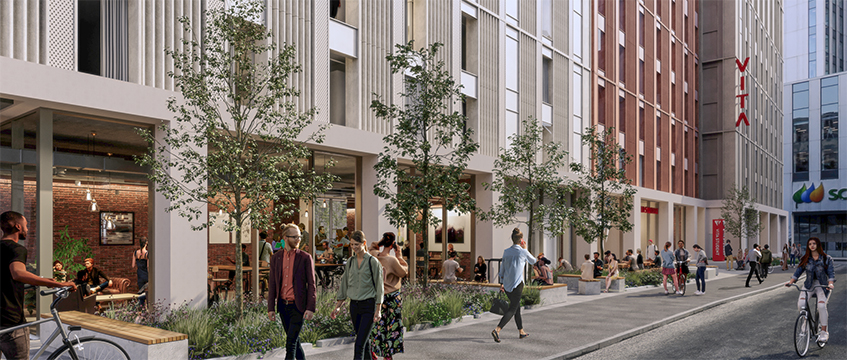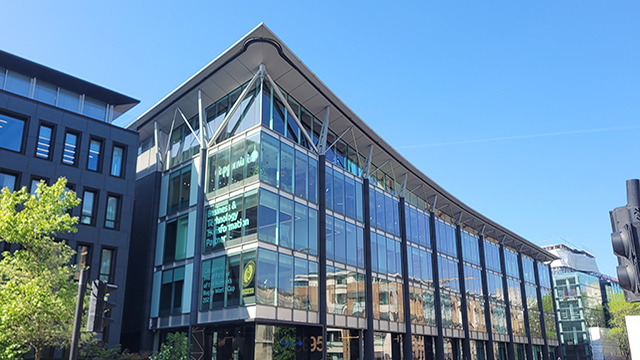Cravecrest Ltd v Trustees of the will of the Second Duke of Westminster and another
Sir Terence Etherton C and Rimer and McCombe LJJ
Collective enfranchisement – Leasehold Reform, Housing and Urban Development Act 1993 – Purchase price – Development value – Tenants’ leases of individual flats having only a few days to run at valuation date – Premium payable on enfranchisement held to include prospect of reconversion to single house on merger of two intermediate leasehold interests – Whether such value excluded on assumption that owner of neither interest individually able to unlock development value – Para 3(1) of Schedule 6 to 1993 Act – Appeal dismissed
In March 2009, the tenants of flats in a converted house in London SW1 claimed the right to acquire the property by collective enfranchisement under the Leasehold Reform, Housing and Urban Development Act 1993, with the appellant as nominated purchaser. The interests to be acquired were the first respondents’ freehold interest plus two intermediate leasehold interests, namely: (i) a headlease of the entire property; and (ii) the second respondent’s overriding leasehold interest in the second and third floors.
The leasehold valuation tribunal (LVT) was asked to determine the premium payable on enfranchisement in accordance with Schedule 6 to the Act. It determined a premium of nearly £6.928m, comprising £2,190 for the freehold, £3.741m for the headlease and £3.184m for the second respondents’ overriding lease. Those figures took into account development value flowing from the prospect of reconverting the property to a single dwelling and developing the roof space into a fourth floor. The LVT reasoned that the participating tenants’ leases had only a few days left to run at the valuation date and that, if the headlease and the overriding lease were treated as a single merged interest acquired by the same person, then, in the absence of the enfranchisement claim, the owner of that interest could shortly have enjoyed vacant possession of the property with the consequent ability to seek reconversion.
The Upper Tribunal upheld that decision on appeal, save that it applied a 5% discount to reflect an element of risk to the hypothetical purchaser under a “two-stage” process who acquired one intermediate interest before being certain of also acquiring the other. It fixed the premium at £6.8565m: see [2012] UKUT 68 (LC); [2012] PLSCS 171.
The appellant appealed. The issues were: (i) whether, on a proper application of Schedule 6, it could be assumed that the headlease and overriding lease would come into the same ownership so as to allow reconversion of the property by the owner of those interests; and, if so (ii) whether the UT had properly applied a discount to reflect the risks to the hypothetical purchaser in a two-stage process. The appellant’s argument largely centred on the bracketed words in para 3(1) of Schedule 6 requiring the relevant interest to be valued as if sold on the open market “(with no person who falls within sub paragraph (1A) buying or seeking to buy)”; the appellant contended that those words required each intermediate interest to be valued separately, ignoring any potential sale of the other.
Thomas Jefferies (instructed by Maxwell Winward LLP) appeared for the appellant; Anthony Radevsky (instructed by Boodle Hatfield) appeared for the first respondents; Timothy Dutton QC (instructed by Walker Morris, of Leeds) appeared for the second respondent.
Collective enfranchisement – Leasehold Reform, Housing and Urban Development Act 1993 – Purchase price – Development value – Tenants’ leases of individual flats having only a few days to run at valuation date – Premium payable on enfranchisement held to include prospect of reconversion to single house on merger of two intermediate leasehold interests – Whether such value excluded on assumption that owner of neither interest individually able to unlock development value – Para 3(1) of Schedule 6 to 1993 Act – Appeal dismissed In March 2009, the tenants of flats in a converted house in London SW1 claimed the right to acquire the property by collective enfranchisement under the Leasehold Reform, Housing and Urban Development Act 1993, with the appellant as nominated purchaser. The interests to be acquired were the first respondents’ freehold interest plus two intermediate leasehold interests, namely: (i) a headlease of the entire property; and (ii) the second respondent’s overriding leasehold interest in the second and third floors.The leasehold valuation tribunal (LVT) was asked to determine the premium payable on enfranchisement in accordance with Schedule 6 to the Act. It determined a premium of nearly £6.928m, comprising £2,190 for the freehold, £3.741m for the headlease and £3.184m for the second respondents’ overriding lease. Those figures took into account development value flowing from the prospect of reconverting the property to a single dwelling and developing the roof space into a fourth floor. The LVT reasoned that the participating tenants’ leases had only a few days left to run at the valuation date and that, if the headlease and the overriding lease were treated as a single merged interest acquired by the same person, then, in the absence of the enfranchisement claim, the owner of that interest could shortly have enjoyed vacant possession of the property with the consequent ability to seek reconversion.The Upper Tribunal upheld that decision on appeal, save that it applied a 5% discount to reflect an element of risk to the hypothetical purchaser under a “two-stage” process who acquired one intermediate interest before being certain of also acquiring the other. It fixed the premium at £6.8565m: see [2012] UKUT 68 (LC); [2012] PLSCS 171.The appellant appealed. The issues were: (i) whether, on a proper application of Schedule 6, it could be assumed that the headlease and overriding lease would come into the same ownership so as to allow reconversion of the property by the owner of those interests; and, if so (ii) whether the UT had properly applied a discount to reflect the risks to the hypothetical purchaser in a two-stage process. The appellant’s argument largely centred on the bracketed words in para 3(1) of Schedule 6 requiring the relevant interest to be valued as if sold on the open market “(with no person who falls within sub paragraph (1A) buying or seeking to buy)”; the appellant contended that those words required each intermediate interest to be valued separately, ignoring any potential sale of the other. Held: The appeal was dismissed. Had there been no intermediate leases between the participating tenants’ leases and the freehold at the date when the right to collective enfranchisement was exercised, the price to be paid for the freehold under the 1993 Act would have reflected the fact that the freeholder would otherwise have been in a position to develop the property within a few days. In that situation, nothing in the 1993 Act would have required that development hope value to be ignored when valuing the freehold, to ascertain the price to be paid for it by the appellant as nominee purchaser. There was no reason why the appellant should be in any better position when ascertaining the price to be paid for the intermediate long leasehold interests of the second respondent and the headlessee.Although the relevant provisions of Schedule 6 should be construed purposively, complexity of the body of legislation and its tortuous history of successive amendment and extension made it particularly important to be cautious about deviating from the ordinary meaning and application of the statutory words. It was not an obvious part of the social policy underlying the legislation to confer on tenants of flats in a building not only the right to acquire the freehold and intermediate leases but to do so at a price that ignored completely the value attributable to development value if those interests, or some of them, were vested in the same person. The purpose of the original version of the bracketed words had been to avoid an enhanced valuation on the basis that the tenant would pay more than others in the open market as a special purchaser because the tenant would then own his or her own home and could stay there indefinitely. There was nothing to indicate that, when the current version was introduced by amendment under the Housing Act 1996, parliament had intended to give the occupying tenant or tenants the right to acquire from the freeholder inherent development hope value without any payment for it: Earl Cadogan v Sportelli [2008] UKHL 71; [2010] 1 AC 226; [2009] 1 EGLR 153 considered.The UT had been entitled to make a valuation on the assumption of a hypothetical two-stage open market purchase, where the same hypothetical purchaser acquired first one, then the other, of the intermediate interests. That did not contravene the express terms of the bracketed words in para 3(1) since the prohibition only applied to the interest being purchased, namely the first intermediate interest notionally to be sold on the open market. Although, in that context, the notional development hope value was dependent on the possible subsequent sale of the other intermediate interest, that hypothetical and purely potential second sale was not something to which the express terms of the bracketed words applied. The exclusion in para 3(1) applied only to a person within subpara (1A) “buying or seeking to buy” the interest being valued; it should not be extended to exclude such a person selling or seeking to sell its own interest. The assumption of a sale of both interests to the same buyer within a short space of time was not contrary to the requirement to value each separately. The allowance of a 5% discount to reflect the risk involved in a two-stage process showed that the UT had valued the two interests separately and was not treating them as a single contemporaneous transaction. Thomas Jefferies (instructed by Maxwell Winward LLP) appeared for the appellant; Anthony Radevsky (instructed by Boodle Hatfield) appeared for the first respondents; Timothy Dutton QC (instructed by Walker Morris, of Leeds) appeared for the second respondent. Sally Dobson, barrister










